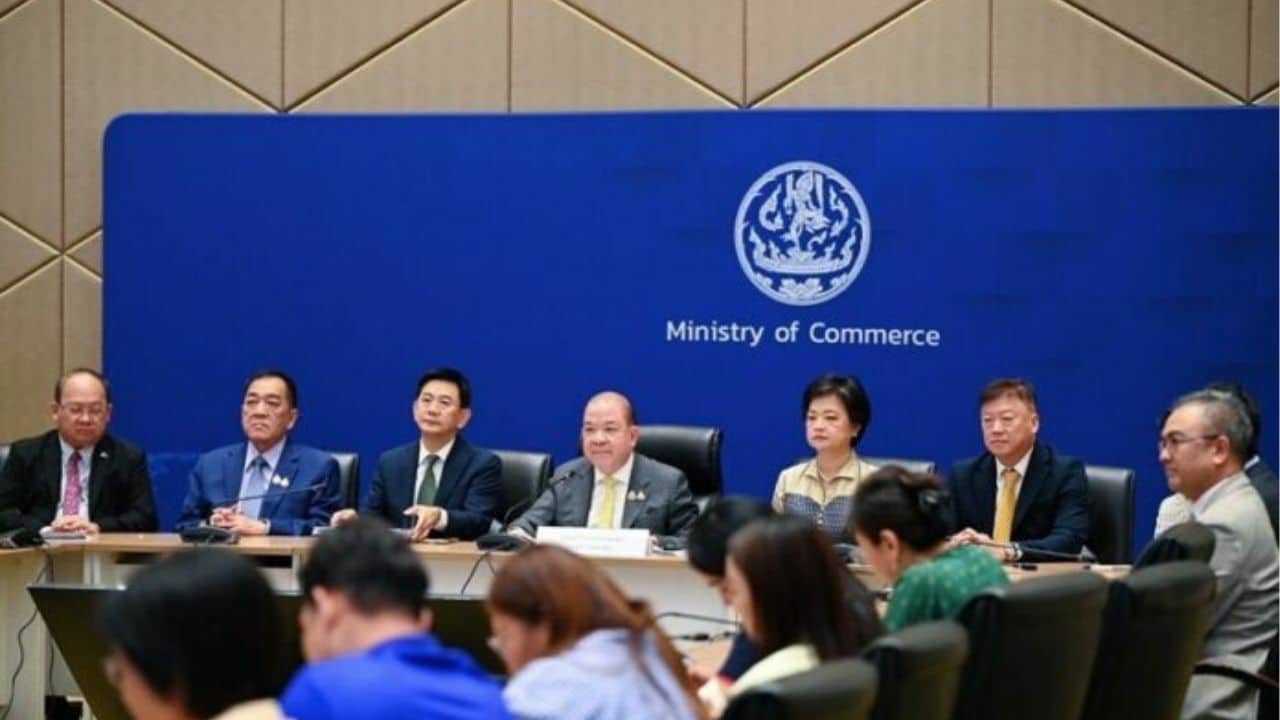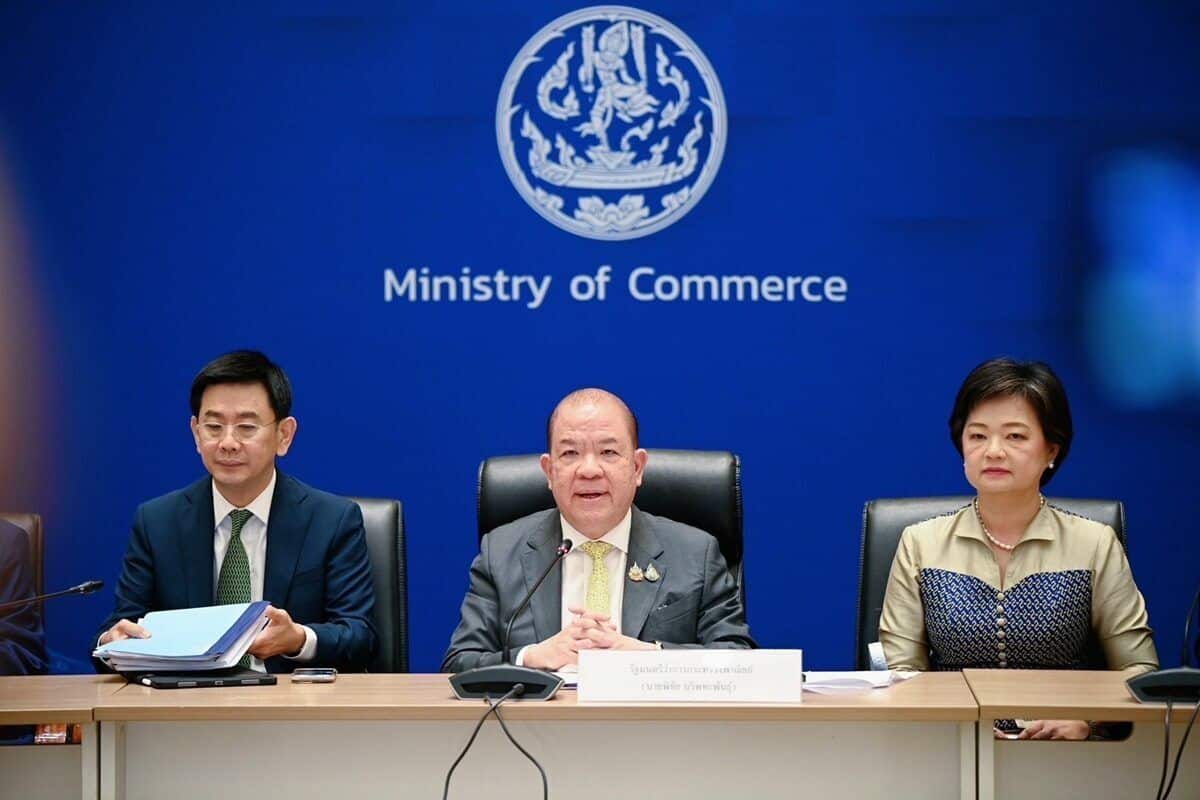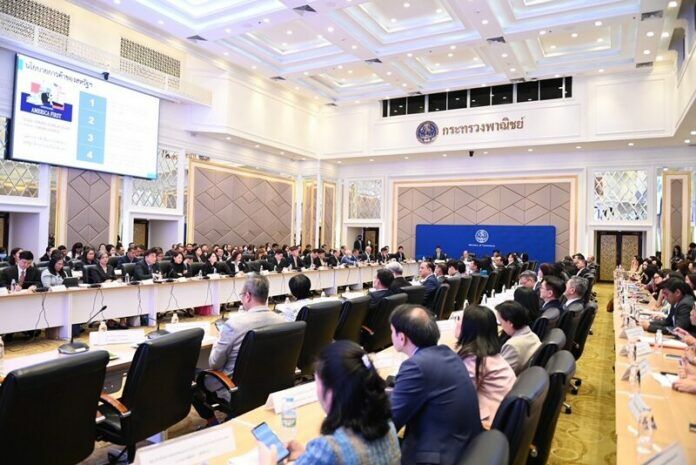Thai commerce ministry unveils 10 policies to boost exports
Thailand targets export growth via FTAs, soft power, and regional strategies

Commerce Minister Phichai Naripthaphan led a policy meeting at the Ministry of Commerce in Bangkok, attended by over 200 participants, including directors from the Department of International Trade Promotion and Thai ambassadors to the World Trade Organisation (WTO). The aim was to address challenges in Thai exports and present 10 urgent policies to advance international trade.
The meeting saw collaboration among key figures such as Wuttikrai Leeweereapan, the ministry’s permanent secretary, Sunanta Kangvalkalakij, the Director General of the Department of International Trade Promotion, and Poj Aramwattananon, chairman of the Thai Chamber of Commerce.
Industry representatives like Kriengkrai Thiennukul from the Federation of Thai Industries and Thanakorn Kasetsuwan from the Thai National Shippers’ Council also attended. Phichai emphasised the importance of integrating efforts across central, international, and regional levels to implement government policies cohesively.
The focus was on enhancing cooperation with the private sector, particularly in strategising export growth for the latter half of the year, amidst challenges like US reciprocal tariffs and global economic fluctuations.
Commerce envoys from around the world proposed strategic market penetration plans targeting five key regions: the United States, India, the Middle East, ASEAN, and China.
Utilising soft power to promote Thai products in premium markets, leveraging free trade agreements (FTAs), and fostering collaboration between provincial commerce offices and international trade envoys were highlighted.

Phichai outlined 10 key policies aimed at turning crises into opportunities, with a focus on expanding export markets, building confidence, and enhancing Thailand’s role in global trade. He noted the positive trajectory of the Thai economy, with exports growing by 10.2% for 10 consecutive months, and an average growth of 12.5% during PM Paetongtarn Shinawatra’s seven-month tenure.
Further, plans to negotiate tariffs with the US, expedite new FTAs with the European Free Trade Association, Bhutan, the EU, the UK, South Korea, and ASEAN-Canada, and manage agricultural products across 25 initiatives were discussed.
Phichai also emphasised promoting the new Thai SELECT symbol to elevate the image of Thai cuisine globally and enhancing seamless cooperation between provincial commerce offices and international trade envoys. Proactive communication of the ministry’s achievements and closer collaboration with the private sector in all dimensions of trade and export were encouraged.
Private sector representatives supported the ministry’s policies. Poj Aramwattananon praised the clear short, medium, and long-term strategies, highlighting the urgency of addressing US tariffs. Kriengkrai Thiennukul appreciated the proactive approach, which aids in private sector planning amid intense competition. Thanakorn Kasetsuwan observed the positive direction of the meeting, citing the ministry’s readiness to champion international trade.

Wuttikrai Leeweereapan noted the minister’s guidance on increasing the value of Thai agricultural products, such as cassava, which is a key ingredient in pharmaceutical production, enhancing its value significantly.
Phichai expressed optimism for 2025 as a promising year for Thai exports if strategic measures, particularly FTAs with the EU and new markets in the Middle East and ASEAN, are implemented effectively. The use of the new Thai SELECT symbol as soft power was also anticipated to elevate Thai food to global standards, reported KhaoSod.
The attendees agreed that diversifying export markets, such as India, Europe, and Saudi Arabia, reduces pressure from competition. The recent meeting with commerce envoys aimed to identify clear collaborative strategies to enhance proactive efforts, acknowledging the intense competition. Recent export figures indicate a positive outlook, with growth opportunities.
The Thai National Shippers’ Council seeks support from the Ministry of Commerce, the Thai Chamber of Commerce, and the Federation of Thai Industries to drive trade initiatives, anticipating at least 3% growth this year. Current exports to the US constitute 18.2% of total exports, down from 40-50% previously, highlighting the need to reduce dependency on any single market.
Latest Thailand News
Follow The Thaiger on Google News:


























